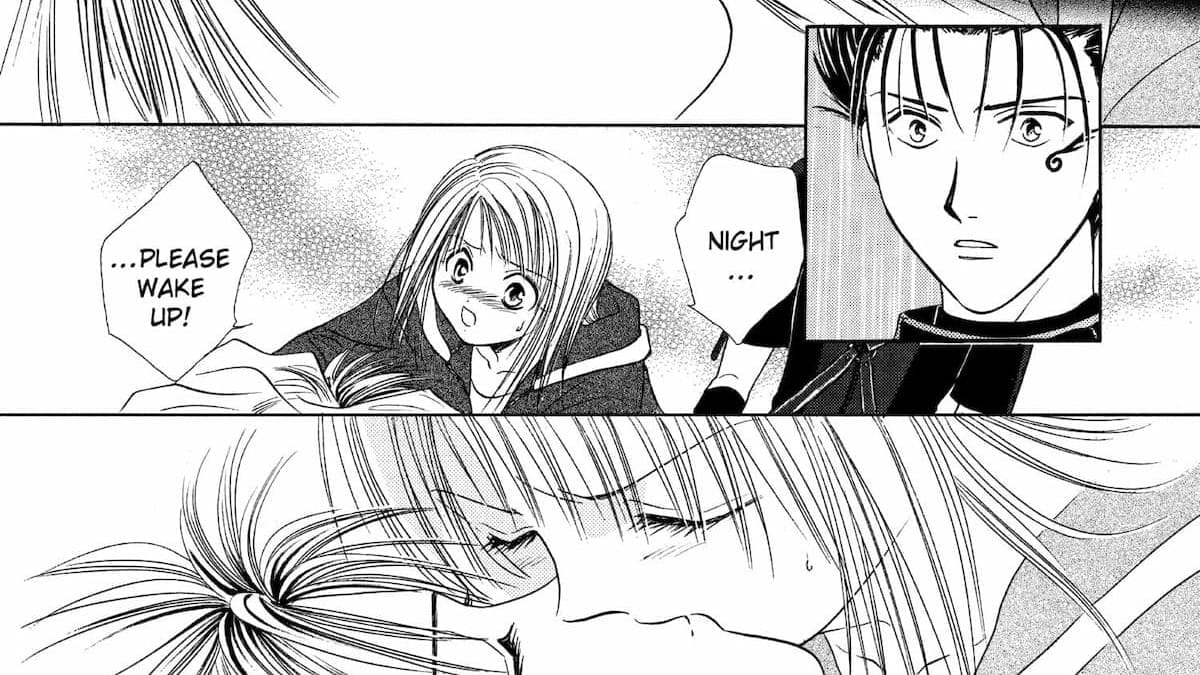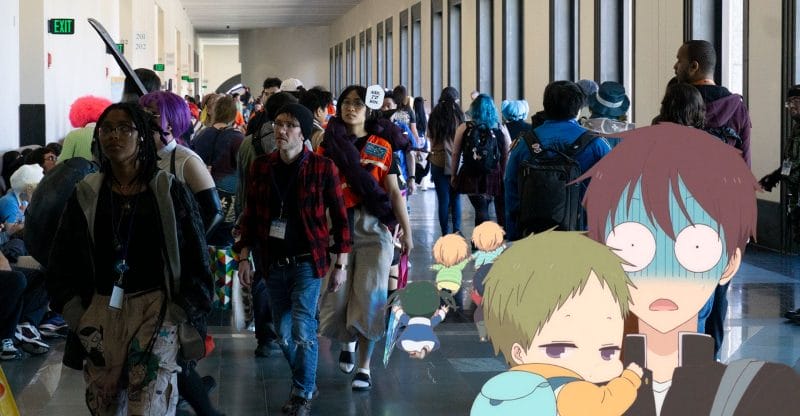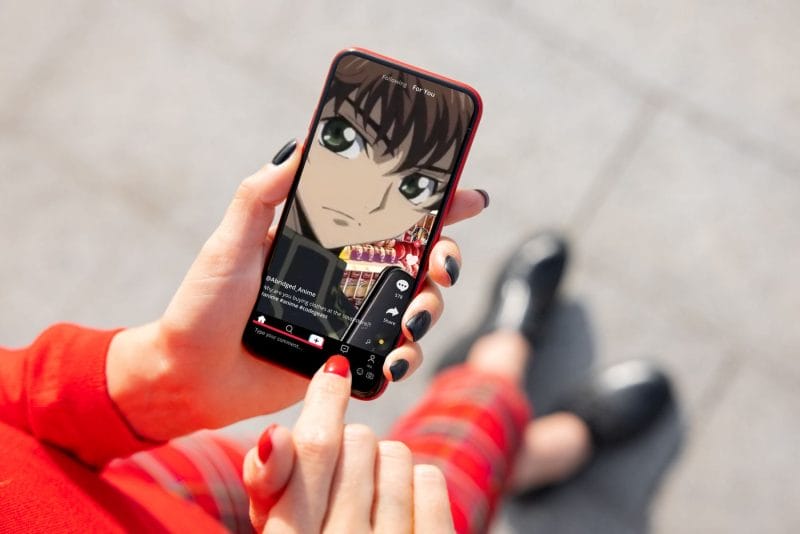Absolute Boyfriend (2003), as Yuu Watase’s answer to seinen manga series like Chobits, explores through a shojo rom-com format what it might mean for a human to have a relationship with an artificial being. What really stands out in this series, however, is how tech companies’ surveillance plays a recurring role. Over the course of the manga, Watase often uses Kronos Heaven, the mysterious tech company that created the titular android lover, as a source of comedy. But reading this series in 2023, these comedic elements seem much more like a prediction, or a reflection, of the dystopian level of power tech companies have to manipulate our world and their surveillance of us every single day. Kronos Heaven is not only predatory towards Riiko, the series’ human protagonist, but also puts her under heavy surveillance after she buys their product. As a result, it’s become less of a comedy and more of a dystopian capitalist nightmare not that different from our own.
Riiko is a high school girl decidedly unlucky in love who easily falls for product gimmicks. One such product is Night, part of a series of “nightly lover figures” created by Kronos Heaven, a mysterious tech company that seeks out Riiko as a customer. Created to her specifications of an ideal boyfriend, Night is devoted to Riiko and designed to be ready to sleep with her at any moment. Comedy is derived from this programming, since he isn’t made to understand normal human boundaries and will strip off his clothes, no matter where he happens to be, if he thinks Riiko requests it. His programming as teenage Riiko’s ideal man also makes him over-the-top in his affection and protectiveness of her, which is both sweet and hilarious, depending on the scene. To complicate matters, Night and Riiko are caught in a love triangle with the human teenager Soshi, who also vies for Riiko’s affection. But Kronos Heaven’s nefarious actions cast a shadow over this otherwise lighthearted rom-com, especially with the benefit of twenty years of hindsight.

Kronos Heaven operates in predatory ways from the beginning of the series. Riiko orders Night by taking advantage of a three-day free trial since, as a high school student, she doesn’t have the money to pay for him. When she doesn’t return Night promptly after those three days, precisely 72 hours after delivery, the company ropes her into an expensive payment plan for the $1 million price tag. Since Riiko has already grown attached to Night, she agrees to pay. However, she later remarks how stifling the payment plan is, since it is an unreasonable expense for a teenager. Riiko’s parents are not in the picture, but in a current-day perspective, this is reminiscent of kids inadvertently, or unthinkingly, racking up obscene charges for in-app purchases of enticing add-ons in games like Roblox and Fortnite, with which their parents end up saddled.
Riiko’s financial stresses lead to comedic scenes of Night failing at jobs he and Riiko get to pay off the debt, but beneath that humour is Kronos Heaven’s exploitative behaviour towards her. In an exaggerated way, it reflects how, today, tech companies will milk us for all we’re worth. They entice us with free trials1 and prices that seem reasonable on the surface,2 but the subscriptions they sell us add up and make life less affordable. Kronos also takes advantage of Riiko’s naivety and loneliness. To make money, real-life tech companies are also willing to take advantage of kids, even if it harms their mental health, which has gotten companies such as Meta sued in the United States.3 You could imagine Kronos being pursued in a similar way if they operated in our world because of the stress they place on Riiko, but the series doesn’t linger on the problem.
In another reflection of our present-day technological dystopia, Kronos Heaven also places Riiko under surveillance and limits her autonomy. This is mainly done by Gaku, a Kronos Heaven salesman. His scenes are often played for laughs, with the illustrations emphasizing his disarming goofiness. But while Watase wants us to find him funny, this doesn’t distract from the fact that he acts in a very creepy way towards Riiko. He is constantly stalking her and appearing unexpectedly to observe her interactions with Night. Gaku even makes a deal with Riiko that she won’t have to pay for Night if she lets him collect data on her emotions and desires in order to improve Kronos’ products.

This predicts how most of the tech products and services we use today require some level of surveillance of us in order to use them, personified through a company employee personally recording Riiko’s movements and thoughts. Not really having a choice financially, Riiko agrees to be surveilled even though the company’s research is secretive and doesn’t benefit her in any meaningful way over the course of the story, similarly to how the data we provide helps companies get us to spend time on their platforms, but doesn’t necessarily to make the user experience better. How often do we think about the Terms and Conditions we agree to and what information, or more, we are giving up in exchange for an app or streaming service?
Gaku’s most egregious behaviour, however, is when he kidnaps Riiko in an attempt to force her to use Night as intended by Kronos. As a lover figure, Night is built to have sex with whoever owns him. Being a teenager, Riiko wants a boyfriend but for most of the series isn’t ready to have sex. However, since Night is programmed to only properly bond with his owner and retain full functionality if he does so, Gaku kidnaps Riiko and Night and brings them to a secluded tropical resort with the goal of getting them to sleep together. This kidnapping and attempted sexual coercion explicitly contradict what Riiko actually wants. She is perfectly happy with having Night as a companion without sex, yet Gaku is determined to make Riiko use Night as Kronos intended, even though she should be able to do as she pleases if Night belongs to her.
While they don’t generally kidnap their users, tech companies in our world also invade our personal lives, with dating apps that have changed how we think about, and act towards, potential partners4 and websites that track our web activity in order to, as Kronos does in selling Night to Riiko, sell us products based on our insecurities.5 This is for companies’ gain and profit, not for the benefit of the user, even if technology is sold as beneficial to us.
Even if tech companies s have fortunately not directly sexually coerced people, they are overbearing, unwilling to stop until they transform every aspect of our lives and frame this “advancement” as good. They also force us to do things they want us to do, even if it is contrary to our own best interests. Adobe threatened to sue individuals 6 who had bought older versions of their software, making people pay for more expensive subscriptions. With DRM and subscription-based software, the terms of contracts can change at any time7 on the company’s whim, just as Riiko is forced to go to the resort according to Gaku’s whim. The way Riiko is treated may not be an exact mirror of reality, but the invasion of her personal life by one of Kronos’ agents doesn’t feel far off from our current technological world or where it is headed.

In later volumes of Absolute Boyfriend, higher-ups at Kronos Heaven are introduced and their portrayal raises further questions. First is Gaku’s superior, Yuki, who appears to be a child and also stalks Riiko. Later, Kronos’ boardroom is depicted. The highest-ranking members of the team are toddlers and the president is a baby who cannot form words. An assistant interprets his flailing and interjection of “Ga-ga!” for the others. Watase doesn’t seem to have much of a rationale behind it except that she thought it would be funny, writing in a sidebar note that the company is “just a gag.” Depicting the upper echelons of Kronos Heaven as small children simply as a gag further trivializes what the company does to harm Riiko, yet it also reads as prescient. Tech companies’ childish antics aren’t confined to fiction, but are part of our capitalist reality.
We have seen in recent years heads of tech companies making decisions with a childlike self-centredness and impulsiveness. Elon Musk has made various decisions while running X based on whims and immature humour: jettisoning Twitter’s unique and established branding just because he likes the letter “X;”8 having press emails automatically responded to with a poop emoji9; and making decisions suddenly based on polls to his followers.10 Meta has also acted with immaturity and pettiness. For example, in June 2023, the Canadian government passed legislation that would require Meta to support its news organizations, since the company has benefited from news on its site while outlets’ subscription revenue has eroded.11
In response, Meta simply removed news links for Canadian users before even attempting to work with the government on a solution.12 The government’s demands have pros and cons, but Meta’s actions are reminiscent of a child throwing a tantrum and not wanting to play with you anymore after you pointed out they weren’t being fair. The image of Kronos’ boardroom readily brings all of these instances to mind, especially because of how Kronos repeatedly tries to force Riiko to do what they want her to do, regardless of her own desires.
Watase couldn’t have predicted these exact events, but her portrayal of the company, despite its obvious silliness, resonates more today than it did when it was written. The series doesn’t amply consider the consequence of a company being run by children or childish people, yet it still accurately portrays how tech companies in our present world can act towards us. In a way, our world has become a gag where we let these companies run amok. Certainly, these companies would like to see us be complacent and laugh off their issues instead of criticizing them. Companies will claim innocence, or even benevolence, despite their immense power and influence over our lives that are far from completely positive. They are often self-centred in their demands to maintain that power, like a child who refuses to share.
Absolute Boyfriend, under the guise of comedy, predicts and reflects the overbearing influence that technology companies have on our daily lives in our current moment. Some of the attempts at humour do sometimes ring true as comments on real tech companies: maybe they really are run by people who are like overgrown children; the way “smart” devices and AI interact with us is often uncanny or awkward; and who hasn’t accidentally paid for something because they forgot when the trial period was up just like Riiko?
Yet, much of the attempted humour in Absolute Boyfriend, given the ways that tech companies impact our lives in often negative ways, is still a discordant note that repeats throughout the series. Even in 2003, a lot of moments in the series shouldn’t have been funny, but the levity of the series suggests these questions were shielded by a lingering optimism about technology and distance from a reality that hadn’t yet come to fruition. Kronos Heaven’s overreaches and idiosyncrasies could be laughed off because they were beyond the realm of possibility. Twenty years on, tech companies have gone much farther in their influence on, and surveillance of, our lives, and it’s not actually that funny to be surrounded by such things all the time.

At the end of the series, Night ceases to function due to damage, but Riiko holds onto the hope that one day some breakthrough will bring back her “eternal boyfriend.” Even though Soshi, a real person who also loves her and who she already has affection for, is right there. Despite the fallibility of the technologies that are part of our lives, we’ve been convinced of their value, like Riiko. We may not have lover figures quite like Night in this world, but the way Kronos, through its product, performs its ultimate manipulation of Riiko reflects how technology encroaches on the most personal aspects of our lives.
It is part of the capitalist project to transform our world which, as anthropologist Lisa Rofel writes, “has the capacity to reach into the sinews of our bodies and the machinations of our hearts.” The ending of the series, reaching for some romantic notion of undying love, represents how no aspect of human experience is untouched by tech companies and that there is no end to their influence and control. Through a more optimistic point of view, this might be seen as a new frontier for love, and that is likely Watase’s intent. But today, it seems darker, a reminder of how technology has become too unavoidable and that companies like it that way.
- Fox 6 Milwaukee: Too good to be true? Why a free trial could cost you ↩︎
- NPR: What my $30 hamburger reveals about fees and how companies use them to jack up prices ↩︎
- Forbes: Meta Sued By 33 States Over ‘Substantial Dangers’ For Kids On Instagram And Facebook ↩︎
- The Guardian: How online dating has changed the way we fall in love ↩︎
- FTC: Commercial Surveillance and Data Security Rulemaking – September 8, 2022 ↩︎
- Vice: Adobe Tells Users They Can Get Sued for Using Old Versions of Photoshop ↩︎
- IGN: Sony Pulls Discovery Videos PlayStation Users Already Own, Sparking Concern Over Our Digital Future ↩︎
- The New York Times: From Twitter to X: Elon Musk Begins Erasing an Iconic Internet Brand ↩︎
- NPR: Twitter now auto-replies to press emails with a poop emoji ↩︎
- Wired: Twitter’s ‘Vox Populi’ Is a Lie ↩︎
- CBC: Your latest questions about Bill C-18 and the blocking of Canadian news answered ↩︎
- CBC: Canadians will no longer have access to news content on Facebook and Instagram, Meta says ↩︎












